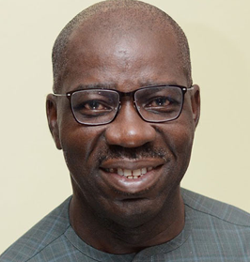
EDO State Governor, Godwin Obaseki, is frenetic about the rising insecurity in his domain with his recent resolve to visit those who matter in Abuja for an urgent assistance. The remedy should be fast to avoid the incessant waste of lives by bandits and rescue residents now living in perpetual fear.
The current anxiety was heightened by the September 24 raid on Ogba Zoo and Nature Park in Benin by kidnappers, who disguised as fun seekers and took away its director, Andrew Ehanire. The dastardly act was swiftly done, but not without first killing the three policemen attached to him. Their captive is a brother to the Minister of State for Health, Osagie Ehanire. A ransom of N350 million was demanded.
His freedom came last Saturday; maybe after the said ransom was paid. Andrew confessed to newsmen shortly after his release that ransom was part of the bargain. His experience was horrific, evident in this emphasis: “I could have died if I had not been released. I was released… in the middle of nowhere.” Another victim, Joseph Osayomore, a popular musician, was kidnapped about the same time and a ransom of N200 million has been demanded. Joseph’s wife was shot in the head during the incident. A Catholic cleric, Lawrence Adorolo, though released now, was abducted on the Auchi-Okene Road last month.
Terrible! It is either kidnapping, bank or highway robbery, shooting by cult groups, or plain murder. Nobody appears safe. Early this month, gunmen trailed Paul Otasowie, an engineering professor of the University of Benin, to the front of his residence and shot him dead.
These and more irked indigenes of the state resident in Abuja to stage street protests. They marched to the National Assembly on October 9, demanding the intervention of the leadership of the Senate and House of Representatives; they also petitioned President Muhammadu Buhari. They asked for the redeployment of the state Commissioner of Police, Haliru Gwandu, and synergy in intelligence sharing among the security agencies in the state.
Obaseki was, therefore, right when he said urgent solution was critical because, “as we move towards the end of the year, crimes of this nature tend to rear their ugly heads.” This is why he should move from rhetoric to action now. The Benin-Lagos Expressway and the Benin Bypass are notorious for banditry, which worsens during the “ember” months.
Even before now, motorists and commuters passed through the dark spots along this long stretch with trepidation. In June, commercial buses blocked the road for 10 hours to register their grievances over the incessant robbery attacks around the Okada town junction, which led to the death of two of their members – a luxury bus driver and his conductor – whose vehicle was shot at sporadically at night. The state was literally frozen in gridlock, compelling the police boss, Secretary to the State Government, Osarodion Ogie, and the state Director of the Department of State Services, Ibrahim Hiliu, to relocate to the area until normalcy was restored.
In the state, robbers use dynamite to attack banks. Two money-deposit banks were victims of such incidents in Igarra town, Akoko-Edo Local Government Area, in November 2015. Before their onslaught, they invaded a police station in the area and killed two of their men to forestall any counter-attack. The remaining cops took to their heels. But a valiant vigilance group provided the only obstacle the robbers faced by barricading their escape route. Eventually, one of them was killed, another arrested, while others fled.
However, in September, the state police command arrested and paraded 70 suspected robbers, kidnappers, cultists and murderers, among them the suspected killer of Lawrence Okojie, a reporter with the Nigerian Television Authority. Gwandu attributed the breakthrough to a partnership with the traditional rulers and residents. This should be deepened to make it an enduring coalition against criminality in the state.
But rounding up suspects has become commonplace and an abused crime combat strategy not taken seriously anymore. The reason: suspects bribe their way out of detention; many convicts do not serve their prison terms, while capital sentences are not enforced. There are nationwide reports of policemen being couriers of arms and ammunition to men of the underworld or of directly joining their train. These shortcomings encourage insecurity.
Where the state falls in all of this should be of concern to the CP and the governor. In 2013, the Edo State House of Assembly amended the state 2009 law on kidnapping and made it a capital offence. Obaseki should implement it. Failure is an encouragement to the perpetrators who now see a boom in that bestiality. Intelligence-driven policing and adoption of high-tech as practised in the United Kingdom, the US and other Western societies, will make the difference in reversing Edo’s ugly security narrative.
Nevertheless, it is everybody’s business to ensure that the frightening inclination to reincarnate the George Iyamus, Lawrence Aninis and Monday Osunbors, the evil troika in the 1980s that made the state ungovernable, is a nullity. Therefore, the Edo Civil Society Organisation that protested at the state Assembly on Monday over the spike in insecurity and for the governor to account for the security vote he collected should sustain the pressure until result is achieved.
END

Be the first to comment